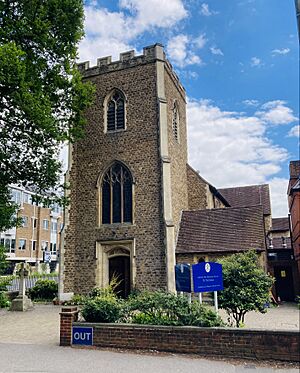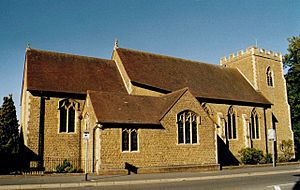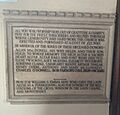St Tarcisius Church, Camberley facts for kids
Quick facts for kids St Tarcisius Church |
|
|---|---|

St Tarcisius Church from the front
|
|
| Lua error in Module:Location_map at line 420: attempt to index field 'wikibase' (a nil value). | |
| OS grid reference | TQ 25699 70492 |
| Location | Camberley |
| Country | England |
| Denomination | Roman Catholic |
| Website | CBParish.co.uk |
| History | |
| Status | Parish church |
| Dedication | Saint Tarcisius |
| Consecrated | 26 June 1926 |
| Architecture | |
| Functional status | Active |
| Heritage designation | Grade II listed |
| Designated | 3 March 2005 |
| Architect(s) | Frederick Walters |
| Style | Gothic Revival |
| Groundbreaking | 12 September 1923 |
| Completed | 18 November 1924 |
| Construction cost | £13,500 |
| Administration | |
| Parish | Camberley & Bagshot |
| Deanery | Woking |
| Diocese | Arundel and Brighton |
| Province | Southwark |
St Tarcisius Church is a Roman Catholic church in Camberley, Surrey, England. It was built almost 100 years ago, between 1923 and 1924. The church was designed by an architect named Frederick Walters. You can find it on London Road, just north of the town, right next to The Atrium Shopping Centre. It is a special building, listed as Grade II, which means it's important for its history and design.
Contents
History of St Tarcisius Church
How the Church Started
Back in 1869, a priest named Father Thomas Purcell would travel from Aldershot. He came to say Mass, which is a special church service, for Catholic people living in Camberley. For a few years, local Catholics had to go to St Joseph's Church, Aldershot for Mass.
In 1873, a piece of land was bought for £120 to build a school. The next year, in 1874, a priest named Father McKenna was chosen to stay in Camberley permanently. In 1879, a kind lady named Lady Southwell gave another piece of land. This is where St Tarcisius Church stands today.
In 1884, a temporary church made of iron was built. This was so the growing number of churchgoers had a place to meet. A house for the priest was built in 1888, and the school was made bigger in 1896.
Building the New Church
In 1906, Father Patrick Twomey arrived in Camberley. He began making plans for a new, permanent church building. The first stone for the church was laid on September 12, 1923. This important event was done by the Bishop of Southwark, Peter Amigo.
The church officially opened its doors on November 18, 1924. Frederick Walters designed the church as a special memorial. It honored British Catholic soldiers who died in the First World War. The church also served as a place of worship for Catholics at the nearby Royal Military Academy Sandhurst. On June 26, 1926, the church was formally dedicated in a ceremony by Cardinal Francis Bourne. Later, in 1935, beautiful stained-glass windows were added. These were designed by an artist named Paul Woodroffe.
Church Design and Look
Outside the Church
St Tarcisius Church has a tall tower on its north-west side. The church is built using a type of stone called Bargate stone. The very top of the tower has a special design called crenellation, which looks like the top of a castle wall. There is a covered entrance, or porch, under the tower.
Above the main entrance, you can see a window with fancy stone patterns called tracery. The parts of the church that stick out on the sides, called transepts, have pointed roofs and also feature traceried windows. Above the main altar area, known as the chancel, there is a large window with five sections of tracery.
Inside the Church
When you enter the porch, you will see memorial plaques made of shiny marble. The main part of the church where people sit, called the nave, has a ceiling made of pine wood. The rows of arches in the nave, known as the arcade, are made of Bath stone. The arches inside the transepts are also made of Bath stone. The wooden benches, called pews, are made of oak. These are the original pews that were put in when the church was first built.
Gallery
Parish Community
Since 2007, St Tarcisius Church has been part of a larger group called the parish of Camberley & Bagshot. This group also includes Christ the King Church in Bagshot and St Peter & St John Church in Old Dean. They work together so that their Mass times do not overlap.
St Tarcisius Church has Sunday Mass at 9:15 AM. Christ the King Church has its Sunday Mass at 11:15 AM. The Sunday Mass for St Peter & St John Church is held on Saturday afternoon at 5:30 PM.
See also
- Roman Catholic Diocese of Arundel and Brighton
 | Sharif Bey |
 | Hale Woodruff |
 | Richmond Barthé |
 | Purvis Young |












